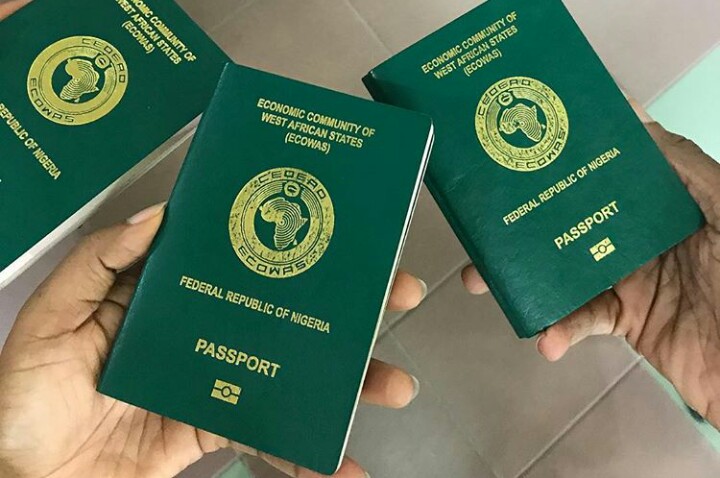Nigeria remains one of the most important markets for students who study abroad in the world, and her students are increasingly considering a wider array of destinations. There are many reasons for this which includes the poor education sector in Africa’s most populous country. Other reasons are for relocation purposes, to gain international exposure & work experience, to boost their job chances in the country, etc.
These reasons have ushered a mass exodus of Nigerians students opting for their education outside the shores of the land According to Market intelligence for international student recruitment from ICEF, Nigeria’s outbound student mobility greatly exceeds that of other African markets.
We have put this article together to guide Nigerians who wish to study abroad – either for their undergraduate or post graduate degrees.
Obtain an international passport

If you don’t have one already, you need to apply for one. This is very important because you will use it for every process that will follow. You will also use it as an identity card during the international exams you will write in the near future. International passport can be obtained from the National Immigration Service offices anywhere in Nigeria. The cost depends on the agents used, city, urgency and other factors.
It should be noted that on the 8 June 2021, the Immigration service announced the application of new passport. To apply, follow these guidelines:
- Visit www.immigration.gov.ng to apply, pay and upload all the required documents for Passports. One important document every Nigerian must have is the NIN Slip or card.
- Interview/appointment will be made for successful applicants. Nigeria Immigration Service won’t attend to any applicant who doesn’t book online appointment.
The new form of passport is called an Enhanced E-Passport. This new Passport is available in these categories: 32 page 5-year validity (Adults and Minors), 64 page 5-year validity (Adults and Minors) and 64 page 10-year validity (Adults (18+) only).
The Agency also warns that nobody must make cash payment at any Issuing Centre. Passport application processing and issuance would take a period of Six weeks; this will be communicated to applicants, one week before collection date.
Any request for reissue can be submitted Six Months before expiration.
Decide where you want to study

Choosing a country you wish to study is not always an easy. In as much as your personal interests are important, you must however come to terms with yourself and think about realities such as:
- The costs of studying in that country: This includes your tuition costs and living costs. Many countries demand you have a specific amount for living cost before you can be admitted.
- Intended Course of study: You must factor in this because not all countries have schools who offer all courses. Russia is one of the few exceptions, as they have federal universities where you can study any course.
- Your graduate career prospects (is there a good job market? Rate of unemployment)
- Your safety and welfare in that country: some countries have been more plagued with the coronavirus than others; some countries have insecurities problems like kidnap, terrorism, etc. It is important you research this.
You should also think about what sort of lifestyle you wish to have during your studies. Do you want to live in a big city or a small university town? Do you want arts and culture? Whatever your interests, be sure they match your study destination so that you really give yourself the best chance of loving your international experience.
Research schools
After settling with the country or lists of countries you want, research schools in those countries. A good place to start is the internet or an education counselor who knows about the country you have chosen to school. There are many factors to consider before selecting a school. Some of them are:
Location: Do you have relatives in the United States or Canada? Do you want to choose schools close to them?
Course Availability: You must make sure that the course you want to study is available in the school you choose. It is important to have a variety of schools or countries to choose from, incase your choice course isn’t available in a school you choose.
Cost: How much can you afford or are you hoping to get some form of scholarship? You have to consider schools that meet your financial ability. Also, cost of living is not the same in all countries. So, if you choose to school in Western Europe, don’t expect the cost of food, accommodation etc. to be the same as other parts of Europe.
Note: There are schools that offer scholarships and student Grants, make sure you diligently do your researches to access to such opportunities.
Sit for relevant exams
Identify the exams you need to sit for and start preparation. The West African Senior School Certificate Exam (WASSCE) certificate is always very important especially for undergraduate degree courses. For international exams, SAT, TOEFL , GRE, GMAT, IELTS , etc are very common exams that are considered.
Let’s take the USA or Canada for example; you need to sit for the SAT and TOEFL/IELTS, for undergraduate degree. GRE or GMAT and TOEFL/IELTS for Masters. If you want to study for a Masters degree in Business Administration (MBA) or a Masters degree in Management, then you need to sit for the GMAT and TOEFL.
If you want a postgraduate degree in Engineering, science or MSc, then, you will sit for the GRE and TOEFL.
TOEFL is exempted for a person who has earned a bachelor’s degree from an accredited institution of higher learning in the English educational system in any English speaking countries/regions, who have a minimum 6.5 on the IELTS.
The TOEFL is more commonly accepted by American institutions, while the IELTS is more commonly accepted overseas, but many schools accept scores from either exam.
Apply to the Schools
Now, that you have chosen your schools, written those exams and passed, it is time to apply to all of them one by one.
Applications can be done on-line (in most schools) or through post for all schools. Every school charges an application fee. Every school has their own admission requirements but they generally have similar requirements. Some basic admission requirements are:
- TOEFL Score
- SAT or GRE/GMAT Score
- High School Transcripts or University Transcripts
- WAEC result
- Bank Statement within the last 6 months
- Recommendation Letter
- Other certificates received
Each school has its own deadline for application, so, be sure to apply on time. The exam scores will not be sent by you but by the exam body directly to the school.
In some cases, there is a two-step application process for international students. This means you must submit two applications: one for a place at the university and one for a place on the course itself. This should be clearly stated on the university’s website. If you still have questions about the process, you should contact your chosen university directly.
Apply for Student Visa
A student visa is an endorsement that is added to a government passport, which permits foreign students to study at a country’s qualified educational institutions.
You can only apply for a student visa if you’re accepted on to a course in that country, after meeting the requirements. Not only that, but you must ensure the course meets the country’s visa requirements. Your student visa acceptance will be determined by a number of factors:
- Your country of citizenship
- Your chosen destination country
- The course you wish to study
- The institution you wish to study at
- How you plan to fund your study
Different countries have differing visa systems and acceptance procedures. However, they are usually very similar. Once successful, you would be invited for an interview at the country’s embassy.
On a student visa you are allowed to stay for the duration of your course, as specified in your initial visa application. You will also be allowed to stay for a short time following the completion of your studies however this can be anything from 60 days to 4 months depending on your chosen destination. Generally on a student visa you are permitted to work up to 20 hours per week. You can only start working once your course has started.
Below is a list of countries you can have your academic study outside Nigeria:
- NETHERLANDS: studyfinder.nl,
- GERMANY: ww2.uni-assist.de ,
- NORWAY: nokut.no/en/ ,
- SWEDEN: universityadmissions.se/intl/start ,
- MALTA: um.edu.mt ,
- UK: en.ukec.com ,
- HUNGARY: studyinhungary.hu ,
- POLAND: go-poland.pl
- CZECH: studyin.cz ,
- FRANCE: campusfrance.org ,
- SWITZERLAND: studyinswitzerland.plus
- ICELAND: study.iceland.is , GREECE: studyingreece.gr , ESTONIA: estonia.dreamapply.com
- USA: https://educationusa.state.gov
- CHINA:
a. cucas.edu.cn
b. m.sicas.cn
c. ciss.org.cn
d. at0086.com
How long do study abroad programs take?
The length of time you spend studying abroad will depend on the program and level of degree you’re undertaking. Generally, an undergraduate degree will take three or four years of full-time study (for example, in the UK the typical length for most subjects is three years, while in the US it is normally four), while a graduate degree such as a master’s degree or equivalent will take one or two years. A doctoral (PhD) program will usually take three to four years.
At many universities across the world, there is also the option of studying abroad for a shorter period of time. Student exchange programs allow you to study abroad for a year, a semester or even just a few weeks. Information about these shorter programs should be available on the website of the main university you plan to enroll at, as well as the university you’d like to be hosted by.
To make it easy for you to process your choice of studying abroad, it is advisable you work with Education agencies involved in international Education. They will rightly advice you on the best path to take.


Discussion about this post